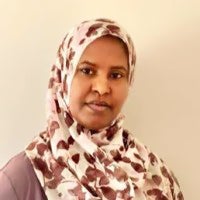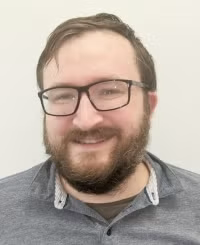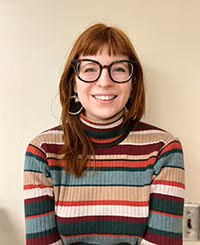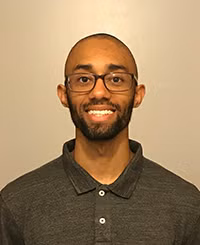CD-Cavs
Mailing Address
Cleveland State University
College of Arts and Sciences
2121 Euclid Ave.
Cleveland, OH 44115
Campus Location
Berkman Hall 218
Science and Research 353
Contact Us
Phone: 216-687-5580
artsandsciences@csuohio.edu
Prior Trainees
Hala Osman

Graduated with a Ph.D. in Applied Biomedical Engineering in 2022. I have always been fascinated by biological sciences and engineering. I am interested in interdisciplinary research because it bridges the gap between the clinical and engineering worlds, with innovative solutions for critical problems. It was my desire to learn, invent, and teach that led me to continue my education towards a doctoral degree in applied biomedical engineering.
My dissertation work in the lab of Dr. Debbie Espy in the School of Health Sciences involved investigation of the effects of multiple exercise intervention methods on gait instability and reactive balance responses among people who have had a stroke. Community-dwelling stroke survivors have a high risk of falling in response to unexpected external perturbations during walking; Regaining balance abilities after a stroke is imperative.
As a biomedical engineer, the focus of my study is to develop quantitative and behavioral measures of responses to induced falls to assess fall risk and fall resistance.
I plan to continue working in this career path that because this line of work can unlock understandings of gait instability in pathologies such as strokes.
Currently, a post-doctoral fellow at Case Western Reserve University School of Medicine, Cleveland, OH
Brandon Smith

Graduated with a Ph.D. in Regulatory Biology in 2023. Brandon has been conducting his research in the laboratory of Dr. Jessica Williams at the Cleveland Clinic and the Department of Biological, Geological and Environmental Sciences (BGES).
We study the multifaceted role of immune signaling in the brain and spinal cord during autoimmunity. Specifically, I am focused on IFNγ-signaling in astrocytes. Traditionally, IFNγ is seen as a proinflammatory and damaging molecule during autoimmunity, but more recent work including my own are showing a beneficial role for IFNγ. Discerning how when and how the immune system can be good or bad during autoimmunity is the primary thrust of my research.
I am passionate about understanding neuroimmunology. The interplay of the brain and immunity is fascinating and I plan to learn all I can about it. In my time at CSU I have deepened my understanding and passion for research and hope to continue learning after I graduate by continuing on to a post-doc and then further research where I can learn and grow further.
Currently, a post-doctoral fellow at the Lerner Research Institute, Cleveland Clinic, Cleveland, OH
Abigail Ansah Zame

Graduated with a Ph.D. in Clinical Bioanalytical Chemistry in 2024. She performed her thesis in the laboratory of Dr. Aimin Zhou in the Department of Chemistry and the Center for Gene Regulation in Health and Disease (GRHD). Her work was focused on the role of Ribonuclease L (RNAse L) in lipid metabolism; RNAse L, present in a wide range of cell types mediates antiviral, antiproliferative, and apoptotic effects of interferons. They have observed that the lack of RNase L leads to foam cell formation in bone marrow-derived macrophages (BMDMs) pinpoints a role for RNAse L in lipid homeostasis and atherosclerosis.
The aims of my research were 1. to demonstrate that RNase L facilitates uptake, intracellular metabolism, and or efflux of cholesterol in macrophages and 2. to investigate the role of RNase L in metabolic syndrome. Previous work done by Dr Zhou's lab shown that, deficiency of RNase L resulted in increased foam cell population in vitro using bone marrow-derived macrophages (BMDMs).
I am passionate about understanding cardiovascular disease and plan to stay in the scientific research community working on finding disease pathways, mechanism of actions and development of therapeutic applications.
Currently, Clinical Chemistry Fellow at the University of Virginia, Charlottesville, VA
Jillian V. Kodger

Graduated with a Ph.D. in Clinical Bioanalytical Chemistry in 2024. Performed her thesis research in the laboratory of Dr. Yana Sandlers in the Department of Chemistry. Her work was on Barth Syndrome; about 90% of Barth syndrome patients will experience dilated cardiomyopathy (DCM) leading to a shorter lifespan. As a result, many Barth syndrome patients will require a heart transplant before the first year of life. DCM causes death in 70% of the patients due to cardiac failure. There is currently no FDA-approved treatment for Barth Syndrome. This creates a critical need to develop novel treatment strategies for Barth syndrome to improve the lives of affected young individuals. We aim to do this with anaplerotic treatments and antioxidants in induced pluripotent stem cells that have been differentiated into induced pluripotent stem cell-derived cardiomyocyte.
The ability to receive a Ph.D. in Clinical Chemistry, will allow me to do meaningful research that can help people directly. Once I obtain the degree, I hope to continue in the research field to improve our health care system. Being able to do this I can immediately see the changes my research has done for patient care.
Currently, Clinical Chemistry Fellow at Yale University, New Haven, CT
Richard Anderson

Graduated with a Ph.D. in Regulatory Biology in 2024. Performed his research in the laboratory of Dr. Anton A. Komar, in the Department of Biological, Geological and Environmental Sciences (BGES) and the Center for Gene Regulation in Health and Disease (GRHD). We study the regulation of gene expression at the level of protein synthesis. The flow of genetic information in a cell goes from DNA to RNA to protein. The resulting proteins then go on to support and regulate numerous biological processes. The process of mRNA translation (protein synthesis) is commonly separated into four phases: initiation, elongation, termination and ribosome recycling. Translation is a highly regulated process which is controlled mainly at the initiation step. We aim to understand the specialized mechanisms of translational control governed by non-canonical translation initiation factor eIF2A in mammals and discover the molecular basis underlying their link to metabolic disease and health.
I believe that CSU has had a big influence on my development as a scientist and as a person. My time as CSU has shown me that I thrive in an academic environment, which is why after graduation, I intend to earn a post-doc, and then work my way towards becoming a professor at a university. Hopefully, one similar to CSU.
Currently, a post-doctoral fellow at Cleveland State University, Cleveland, OH
Mailing Address
Cleveland State University
College of Arts and Sciences
2121 Euclid Ave.
Cleveland, OH 44115
Campus Location
Berkman Hall 218
Science and Research 353
Contact Us
Phone: 216-687-5580
artsandsciences@csuohio.edu